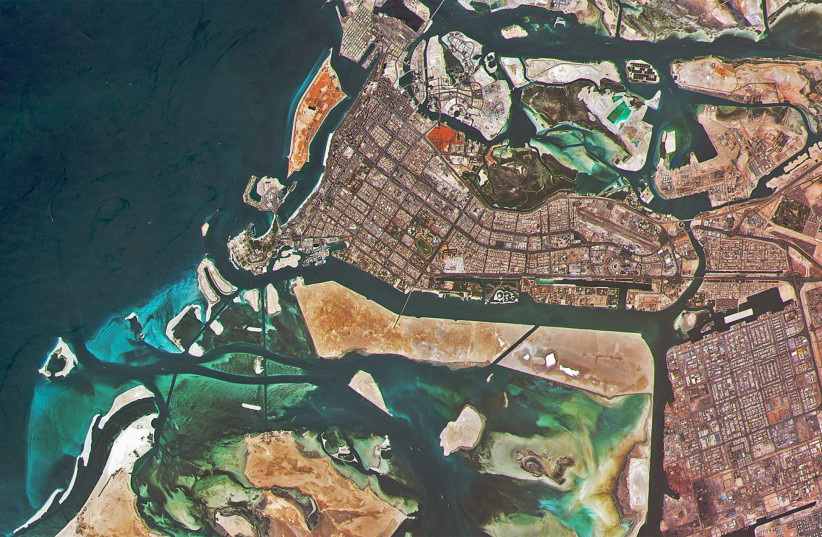The United Arab Emirates is very unhappy with the US move toward removing the Islamic Revolutionary Guard Corps from its Foreign Terrorist Organizations list, a source in Abu Dhabi said on Monday.
Some in Abu Dhabi “are in great shock,” and they view the possibility of the IRGC’s designation being removed in the same way as Israel does, the source said.
Prime Minister Naftali Bennett and Foreign Minister Yair Lapid released a statement on Friday saying they “find it hard to believe that the IRGC’s designation... will be removed in exchange for a promise not to harm Americans.... We believe the [US] will not abandon its closest allies in exchange for empty promises from terrorists.”
It has been difficult for the UAE to work with the Biden administration on defense issues and the relationship has deteriorated, the source added.
Abu Dhabi Crown Prince Mohammed bin Zayed and Saudi Arabia’s Crown Prince Mohammed bin Salman declined to take calls from US President Joe Biden to discuss energy issues stemming from US sanctions on Russia, because of their dismay with US policy in the Gulf, The Wall Street Journal reported. Prior to that, the UAE and Saudi Arabia did not sign on to a US-backed UN Security Council resolution last month condemning Russia for invading Ukraine for the same reason.

Saudi Arabia and the UAE have been repeatedly targeted by the Iran-backed Yemeni Houthi rebels in recent months, and were disappointed with the US response, which they view as too restrained. They are also concerned that the Iran nuclear deal the US is involved in negotiating does not address their security needs.
The US removed the Houthis from its list of foreign terrorist organizations last year.
Prime Minister Naftali Bennett also continued speaking out against the possible delisting of the IRGC, calling it “delusional” at a Yediot Aharonot conference.
The IRGC is “the biggest terrorist organization in the world, which is state sponsored, attacks the Emirates and others and tries to hurt Americans and Israelis,” Bennett said.
The prime minister said Israel had success in campaigning against the closure of two International Atomic Energy Agency probes of possible military dimensions of Iran’s nuclear program. IAEA Secretary-General Rafael Grossi did not agree to end the investigations as part of the Iran nuclear talks, in contrast to the IAEA’s behavior after the original Iran deal was signed in 2015.
Asked why he has been less vocal in his opposition to the Iran deal than his predecessor Benjamin Netanyahu, Bennett said it’s clear the US wants a deal.
“I fight when I can win and for an appropriate goal,” he said. “The difference between 2015 and 2022 is not the agreement [with Iran] but what Israel will do. We are going from words to actions. This time, unlike in 2015, we made a massive move to build up our force.... Iran sees that when it sends its proxies to attack us, there is a more forceful response.”
BENNETT SAID Israels should “not have terrible anxiety” about Iran, saying, “There is reason to be concerned... we are on it.”
Speaking at the same conference, Defense Minister Benny Gantz stressed that the IRGC should remain on the terrorist blacklist and that Washington should not delist the group.
“I want it to be clear,” he said, “this is a terror organization and as such, they should remain [on the list]. We need to coordinate our moves with the United States as well as our positions and we will continue to voice them unequivocally.”
Gantz stated that the strategic relations between Jerusalem and Washington as well as with other Western countries “are not managed on Twitter,” rather face to face between officials.
“I am in contact with American officials and I travel to all regional countries, some that we have relations with and even those that we don’t. Iran is a global problem, a regional problem, and a potential existential threat to the State of Israel, so we must not be first in line but we must harness the world,” the defense minister said.
According to Gantz, Israel is “mobilizing” neighboring countries for regional cooperation in the face of Iran’s aggression.
“We must put forth our intelligence capabilities as well as offensive and defensive,” he said, explaining that the deal set to be signed between Iran and Western countries is not a good one.
“This agreement is not good. It has holes in it and we are making it clear during working groups with the Americans and we need to make sure that in the coming years that we do everything we can to make up for the holes that exist [in the agreement].”
While Israel is not a party to the agreement being negotiated in Vienna, Gantz said that while Jerusalem will not stop the dialogue that is constantly happening with officials in Washington, “The Prime Minister said this and so do I: We will keep our destiny in our hands and not in the hands of the fate of the world.”
The US and Iran have been indirectly negotiating in Vienna to rejoin the 2015 nuclear deal for the past 11 months. The deal placed restrictions on Iran’s nuclear deal in exchange for the gradual lifting of sanctions. Most of those restrictions expire at the end of 2025. In addition, in recent years, Iran has far surpassed the deal’s 3.67% uranium enrichment limit, enriching to 60% – weapons-grade uranium is enriched to 90% – and has converted some of it to a format that is hard to dilute or transport.
In addition, critics of the Iran deal point out that lifting sanctions on the regime would allow money to flow to the IRGC and its proxies, while it does not limit their malign behavior in the region or Iran’s ballistic missile program.
